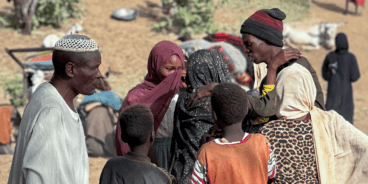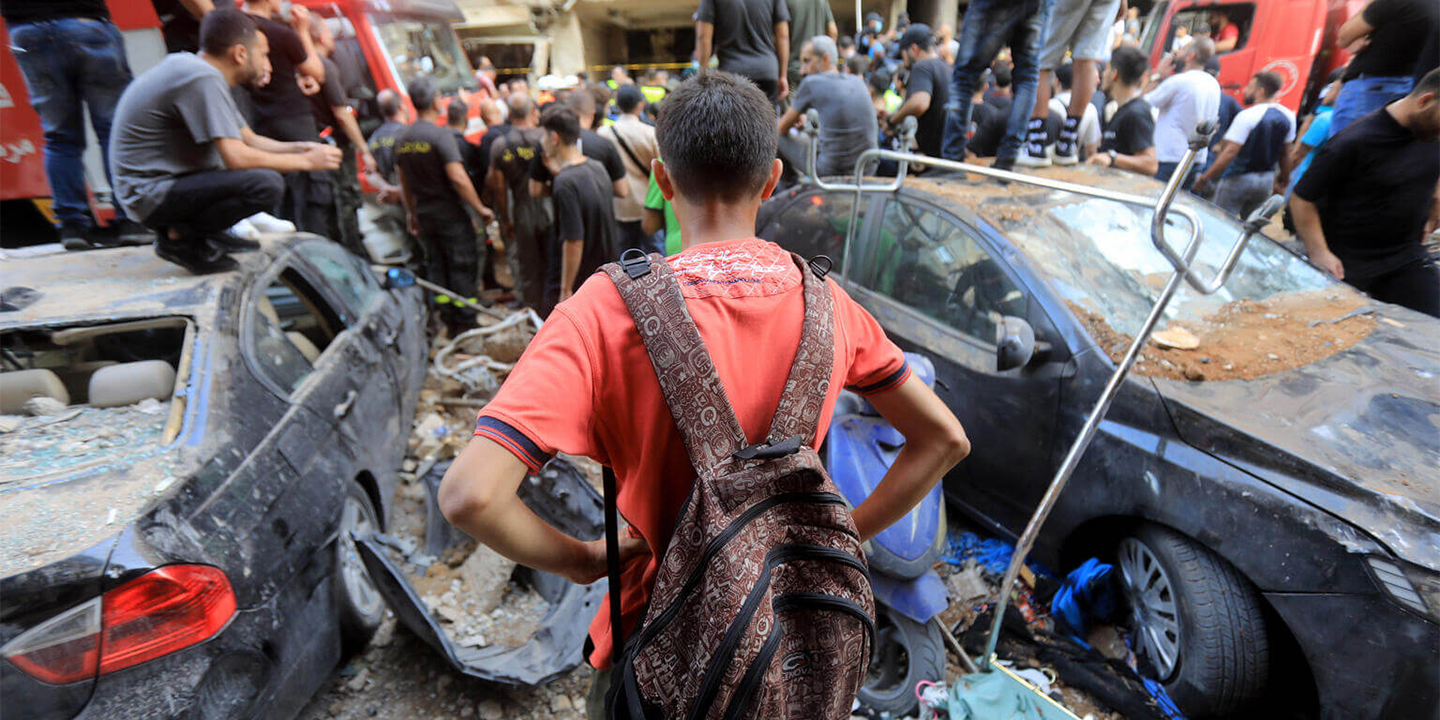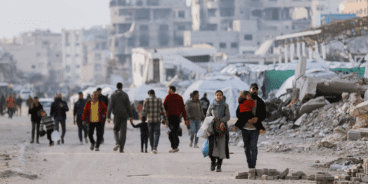

Atrocity Alert No. 412: Lebanon, Haiti and Venezuela
Atrocity Alert is a weekly publication by the Global Centre for the Responsibility to Protect highlighting situations where populations are at risk of, or are enduring, mass atrocity crimes.
CIVILIANS AT IMMINENT RISK AS TENSIONS ESCALATE IN THE MIDDLE EAST
Since 23 September Israel has intensified and expanded its indiscriminate and large-scale airstrikes on Lebanon, reportedly killing at least 1,030 people and injuring 6,000 so far, in a purported attack on Hezbollah leadership. Several UN officials and experts have called for an immediate ceasefire between Israeli forces and Hezbollah militants, warning that the escalation of cross-border violence between Israel and Lebanon risks engulfing the wider region into a humanitarian, human rights and geopolitical catastrophe. In recent days both Iran and the Houthis in Yemen have launched missile attacks toward Israel. These strikes have prompted retaliatory attacks by Israel.
On 1 October Israel began “limited ground incursions” into southern Lebanon as intense artillery shelling and air raids targeted towns near the border. The UN Interim Force in Lebanon, which patrols the line of separation between Lebanon and Israel, highlighted that any Israeli crossing into Lebanon would be “in violation of Lebanese sovereignty and territorial integrity, and a violation of resolution 1701” unanimously adopted by the UN Security Council (UNSC) in 2006 with the aim of stopping the Israel-Hezbollah conflict.
Israel says it is targeting the leadership and infrastructure of Hezbollah; however, UN experts have reported that the airstrikes, many of which have landed in areas of Beirut, are being carried out in densely populated areas “where residential buildings are being levelled to the ground and people are given unrealistically short evacuation orders before homes are bombed.” According to the UN Office for the Coordination of Humanitarian Affairs, more than one million people have been displaced across Lebanon, 90 percent in one week alone. On 2 October the Israeli military warned people to evacuate another 24 villages across southern Lebanon, located in the UN-declared buffer zone.
A group of UN Special Procedures emphasized, “We firmly condemn Israel’s use of the same destructive violence that was applied in Gaza to its attacks on Lebanon, suggesting that attacks on civilians are justified because Hezbollah members allegedly hide among them and use civilians as human shields… The escalation and expansion of attacks against civilians, which we now see in Lebanon, comes on top of a genocidal campaign against the Palestinian people, especially in Gaza.” Israeli military strikes across the Gaza Strip reportedly killed at least 60 Palestinians overnight on 2 October, including in a school sheltering displaced families.
The increasingly intense exchanges of fire mark the most significant escalation in the nearly yearlong cross-border violence. Hezbollah has fired missiles indiscriminately toward northern Israel since 8 October, uprooting approximately 60,000 people and resulting in the death and injuries of dozens of people. Meanwhile, tens of thousands of homes across Lebanon have been allegedly damaged or destroyed by Israeli bombardments. Twenty-five water facilities have been damaged, depriving nearly 300,000 people in Lebanon guaranteed minimum services such as clean water and sanitation.
All parties must immediately cease hostilities and the UNSC should intervene swiftly to avert further regional escalation. International actors with influence must pressure all parties to comply with their obligations under International Humanitarian Law, including the principles of distinction, proportionality, precaution and necessity, to prevent further suffering and civilian harm. All governments arming the parties must immediately suspend military assistance and arms sales.
UN RENEWS SECURITY MISSION AS HAITIANS GRAPPLE WITH GROWING PROTECTION CRISIS
On 30 September the UN Security Council renewed the mandate of the Multinational Security Support Mission (MSS) to Haiti for another 12 months. The MSS was first authorized in October 2023 to provide operational support to the Haitian National Police to counter gangs and restore basic security and state control, but it faced numerous challenges delaying the deployment of Kenyan police until late June. Haitian leaders warned last week that they are “nowhere near winning” the battle against the gangs.
While Haitians have grappled with the prevalence and spread of gang violence for years, the human rights and humanitarian situation has significantly deteriorated since the end of February. Since then, gangs have consolidated their control over the capital, Port-au-Prince. As of mid-September, the rampant insecurity has displaced over 700,000 people – 22 percent more than in March. A new report by the Office of the UN High Commissioner for Human Rights (OHCHR) details grave patterns of human rights violations and abuses across Port-au-Prince and in the Artibonite Department – as well as in the southern part of the West Department, which had been generally unaffected by violence until recently.
Since January at least 3,661 people have been killed, including by targeted executions and random shootings. UN High Commissioner for Human Rights Volker Türk stressed, “No more lives should be lost to this senseless criminality.” OHCHR also documented mass kidnappings, forced recruitment, exploitation and trafficking of children by gangs, and the burning and looting of civilian infrastructure. Gangs are increasingly using sexual violence, including rape and collective rape, “to punish, spread fear and subjugate populations.” The latest estimates from the UN Population Fund indicate that 94 percent of women and girls are at risk of sexual and gender-based violence. Additionally, OHCHR documented abuses during police operations and patrols that could constitute the use of unnecessary and disproportionate force.
Meanwhile, in Artibonite, the country’s main agricultural region, gang violence and extortion have forced farmers to abandon more than 3,000 hectares of land, further endangering people’s livelihoods and compounding an already critical humanitarian emergency. The Integrated Food Security Phase Classification analysis from 1 October reveals that 5.4 million Haitians are facing crisis, emergency and famine levels of hunger, representing one of the highest proportions of acutely food insecure people in any crisis worldwide.
The international community must provide additional resources and support, including through direct contributions for the MSS and adequate funding for the UN’s humanitarian appeal for Haiti. The international community should also urgently bolster efforts to curb the flow of illicit weapons and ammunition to gangs in Haiti.
UN INVESTIGATIONS WARN CRIMES AGAINST HUMANITY CONTINUE IN VENEZUELA
On 17 September the UN Human Rights Council (HRC)-mandated Fact-Finding Mission on Venezuela (FFM) released its latest report, which focused on intensifying state-led repression over the past year. According to the FFM, “Venezuela’s Government has dramatically intensified efforts to crush all peaceful opposition to its rule, plunging the nation into one of the most acute human rights crises in recent history.”
While systematic attacks against democratic and civic space intensified throughout the past year, the presidential election on 28 July triggered “a new milestone in the deterioration of the rule of law.” In response to growing concerns over electoral fraud, authorities resorted to a brutal crackdown of “massive and indiscriminate character,” targeting protesters, members of the opposition, human rights defenders, journalists and other actual or alleged opponents, as well as individuals involved in the electoral process. According to Venezuelan human rights organization Foro Penal, more than 1,700 individuals have been arrested between 29 July and 23 September alone. Venezuelan authorities have also used various telecommunication channels to spread hate speech and inflammatory rhetoric. The passing of a so-called “Anti-NGO Law” in mid-August, as well as increasing threats and attacks against civil society organizations, have further been used to silence dissent and prevent activists from engaging with UN mechanisms.
The FFM confirmed that policies of torture, arbitrary detentions, sexual violence and other violations and abuses “continue to be part of the same widespread and systematic attack against the civilian population as documented since 2019.” It also warned that there are reasonable grounds to believe that Venezuelan authorities have committed the crime against humanity of politically motivated persecution as part of a “continuing and coordinated plan to silence, discourage and squash opposition to the Government of President Nicolás Maduro.”
While the FFM remains the only independent international body specifically mandated to investigate serious human rights violations and abuses and advance accountability for victims and survivors across Venezuela, the mandate is set to expire in early October. At the time of writing, the governments of Argentina, Canada, Chile, Guatemala, Ecuador, Paraguay and Uruguay have introduced a draft resolution at the HRC which seeks to renew the FFM – as well as the monitoring and reporting mandate of the Office of the UN High Commissioner for Human Rights – for an additional period of two years. Elisabeth Pramendorfer, Latin America expert at the Global Centre for the Responsibility to Protect, said, “In light of the deteriorating repression in Venezuela, it is imperative that all HRC member states vote in favor of the resolution, which will ensure critical investigations on recurrence of crimes against humanity and can help inform the international community on necessary prevention and mitigation strategies to address looming atrocity risks in Venezuela.”
Related Content


Atrocity Alert No. 434: Sudan, Ethiopia and the UN Human Rights Council
